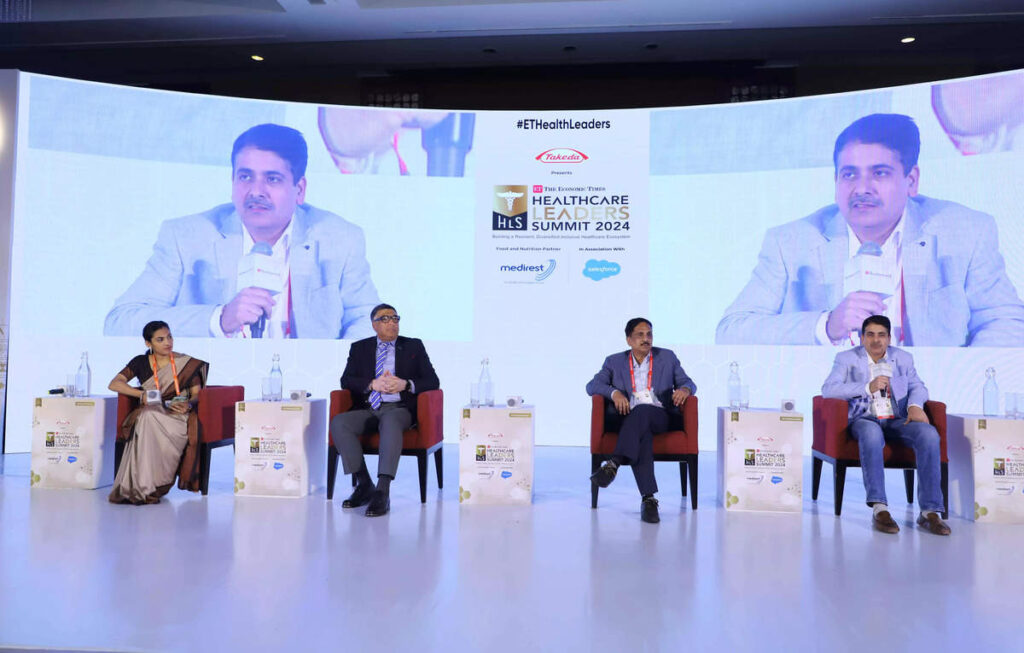Deficit of standardised data a roadblock to develop AI-based healthcare models in India: Experts, ET HealthWorld

By Rashmi Mabiyan and Abhijeet Singh
New Delhi: The never-ending demand for healthcare services bulked with the presumptions of favourable results, places immense pressure on the Indian industry still operating on traditional models and is expected to rise further, driven by the high disease burden in the country compounded with an expanding middle-aged population who are more prone to chronic health issues.
To tackle this impending challenge, experts from various sectors have chorused ‘automation’ as a potential solution, backed by its ability to deliver effective services in significantly less time, thereby helping to balance the demand and supply equilibrium along with addressing the perineal talent deficit in the ecosystem.
Pioneering in this regard at the Fourth edition of Healthcare Leaders Summit, ETHealthworld convened a panel discussion on ‘Is Intelligent Automation Healthcare CIO’s Key to Achieving Quality Management Maturity?’
The panel comprised Dr Shafqat Khan, Public Health Officer, Government of J&K; Dr Susil Kumar Meher, Head-IT, AIIMS; Arun Goyal, Chief Information Officer, Sir Ganga Ram Hospital; Nitin Chopra, Head-IT, Fortis Healthcare and the discussion was moderated by Rashmi Mabiyan, Principal Correspondent, ETHealthworld.
Speaking at the discussion Dr Susil Kumar Meher said, “Earlier it was data and information only but now some new layers have come up like knowledge and intelligence where the latter represents AI and by 2029 will have Super AI. The fundamental of all this is data but if the data is not clean then the model will not work perfectly. Many people have used either fabricated data or the ones which are not cleaned properly. So, data has to be properly standardised. Also, we don’t have any regulator to certify the models which are emerging nowadays.”
With respect to leveraging data through Intelligent Automation (IA) for continuous quality improvement another panellist Dr Shafqat Khan stressed, “The data generated in our healthcare sector mostly comes from the public healthcare sector. The private sector generates considerably less amount of data as compared to the public sector. Unfortunately, enough thrust has not gone into the accreditation process, and quality assurance system. The public healthcare setups are now understanding that quantified and qualitative analysis of the machinery is key to generate good data which can eventually help to create much better AI models for diagnosis, robotic surgeries etc.”Highlighting the challenges in integrating IA in legacy hospitals Nitin Chopra shared, “In a legacy system, consolidating the data from fragmented devices is a huge challenge. Secondly, there are vulnerabilities in the old system such as lack of support devices, then there are challenges in data migration because the existing data is in old formats.”
“Apart from these technical barriers one key challenge is the resistance of adoption of newer applications, data workflows by the training staff who are still using the older ones,” Chopra added.
Elaborating on the financial implications of IA adoption Dr Meher stated if AI-based models are used carefully they can play an important role in reducing patient turnaround time, and outcomes and thus influencing key performance indicators (KPI) which can later improve the return on investment (ROI) as well.
Among other emerging trends Dr Khan underlined the success of digital platforms like CoWIN, U-WIN which ensure transparency, accountability and ease of doing business for the hospitals along with assisting patients at various stages of treatment. He also cautioned that “AI-based systems are going to be the future of healthcare but when it will be based on accurate, clean data. Until then we cannot solely rely on AI systems and they have to be counter-verified by doctors at each stage.”
In conclusion, the Fourth Edition of the Healthcare Leaders Summit underscored the critical role of Intelligent Automation (IA) in addressing the challenges of India’s healthcare landscape, particularly in light of increasing demand and resource limitations.
The panel highlighted that while automation, AI, and data-driven approaches can greatly improve healthcare efficiency and quality, significant challenges remain. These include data standardization, overcoming technical and operational barriers in legacy systems, and training staff to adopt new workflows.
Nonetheless, as Dr. Meher and Dr. Khan pointed out, the adoption of IA holds promising potential to enhance healthcare delivery, reduce patient turnaround times, and improve ROI. However, for IA and AI to reach their full potential, careful handling of data and continuous human oversight is essential to ensure that these technologies augment, rather than replace, medical expertise.










